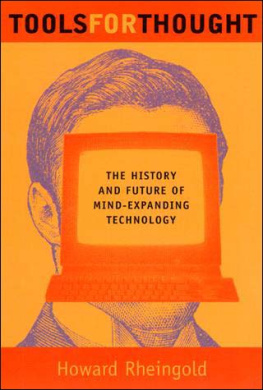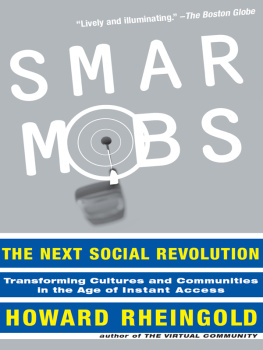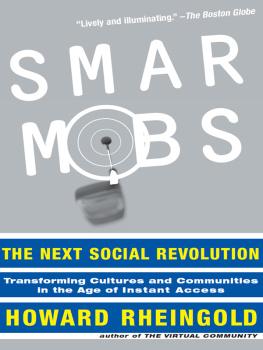Howard Rheingold - Tools for Thought
Here you can read online Howard Rheingold - Tools for Thought full text of the book (entire story) in english for free. Download pdf and epub, get meaning, cover and reviews about this ebook. year: 2000, publisher: MIT Press, genre: Art. Description of the work, (preface) as well as reviews are available. Best literature library LitArk.com created for fans of good reading and offers a wide selection of genres:
Romance novel
Science fiction
Adventure
Detective
Science
History
Home and family
Prose
Art
Politics
Computer
Non-fiction
Religion
Business
Children
Humor
Choose a favorite category and find really read worthwhile books. Enjoy immersion in the world of imagination, feel the emotions of the characters or learn something new for yourself, make an fascinating discovery.
- Book:Tools for Thought
- Author:
- Publisher:MIT Press
- Genre:
- Year:2000
- Rating:4 / 5
- Favourites:Add to favourites
- Your mark:
- 80
- 1
- 2
- 3
- 4
- 5
Tools for Thought: summary, description and annotation
We offer to read an annotation, description, summary or preface (depends on what the author of the book "Tools for Thought" wrote himself). If you haven't found the necessary information about the book — write in the comments, we will try to find it.
Tools for Thought — read online for free the complete book (whole text) full work
Below is the text of the book, divided by pages. System saving the place of the last page read, allows you to conveniently read the book "Tools for Thought" online for free, without having to search again every time where you left off. Put a bookmark, and you can go to the page where you finished reading at any time.
Font size:
Interval:
Bookmark:
Chapter One: The Computer Revolution Hasn't Happened Yet South of San Francisco and north of Silicon Valley, near the place where the pines on the horizon give way to the live oaks and radiotelescopes, an unlikely subculture has been creating a new medium for human thought. When mass-production models of present prototypes reach our homes, offices, and schools, our lives are going to change dramatically. |
Nobody knows whether this will turn out to be the best or the worst thing the human race has done for itself, because the outcome of this empowerment will depend in large part on how we react to it and what we choose to do with it. The human mind is not going to be replaced by a machine, at least not in the foreseeable future, but there is little doubt that the worldwide availability of fantasy amplifiers, intellectual toolkits, and interactive electronic communities will change the way people think, learn, and communicate.
It looks as if this latest technology-triggered transformation of society could have even more intense impact than the last time human thought was augmented, five hundred years ago, when the Western world learned to read. Less than a century after the invention of movable type, the literate community in Europe had grown from a privileged minority to a substantial portion of the population. People's lives changed radically and rapidly, not because of printing machinery, but because of what that invention made it possible for people to know. Books were just the vehicles by which the ideas escaped from the private libraries of the elite and circulated among the population.
The true value of books emerged from the community they made possible, an intellectual community that is still alive all over the world. The printed page has been a medium for the propagation of ideas about chemistry and poetry, evolution and revolution, democracy and psychology, technology and industry, and many other notions beyond the ken of the people who invented movable type and started cranking out Bibles.
Because mass production of sophisticated electronic devices can lag ten years or more behind the state of the art in research prototypes, the first effects of the astonishing achievements in computer science since 1960 have only begun to enter our lives. Word processors, video games, educational software, and computer graphics were unknown terms to most people only ten years ago, but today they are the names for billion-dollar industries. And the experts agree that the most startling developments are yet to come.
A few of the pioneers of personal computing who still work in the computer industry can remember the birth and the dream, when the notion of personal computing was an obscure heresy in the ranks of the computing priesthood. Thirty years ago, the overwhelming majority of the people who designed, manufactured, programmed, and used computers subscribed to a single idea about the proper (and possible) place of computers in society: "computers are mysterious devices meant to be used in mathematical calculations." Period. Computer technology was believed to be too fragile, valuable, and complicated for nonspecialists.
In 1950 you could count the people who took exception to this dogma on the fingers of one hand. The dissenting point of view shared by those few people involved in a different way of thinking about how computers might be used. The dissenters shared a vision of personal computing in which computers would be used to enhance the most creative aspects of human intelligence--for everybody, not just the technocognoscenti.
Those who questioned the dogma of data processing agreed that computers can help us calculate, but they also suspected that if the devices could be made more interactive, these tools might help us to speculate, build and study models, choose between alternatives, and search for meaningful patterns in collections of information. They wondered whether this newborn device might become a communication medium as well as a calculating machine.
These heretical computer theorists proposed that if human knowledge is indeed power, then a device that can help us transform information into knowledge should be the basis for a very powerful technology. While most scientists and engineers remained in awe of the giant adding machines, this minority insisted on thinking about how computers might be used to assist the operation of human minds in nonmathematical ways.
Tools for Thought focuses on the ideas of a few of the people who have been instrumental in creating yesterday's, today's, and tomorrow's human-computer technology. Several key figures in the history of computation lived and died centuries or decades ago. I call these people, renowned in scientific circles but less known to the public, the patriarchs. Other co-creators of personal computer technology are still at work today, continuing to explore the frontiers of mind-machine interaction. I call them the pioneers.
The youngest generation, the ones who are exploring the cognitive domains we will all soon experience, I call the Infonauts. It is too early to tell what history will think of the newer ideas, but we're going to take a look at some of the things the latest inner-space explorers are thinking, in hopes of catching some clues to what (and how) everybody will be thinking in the near future.
As we shall see, the future limits of this technology are not in the hardware but in our minds. The digital computer is based upon a theoretical discovery known as "the universal machine," which is not actually a tangible device but a mathematical description of a machine capable of simulating the actions of any other machine. Once you have created a general-purpose machine that can imitate any other machine, the future development of the tool depends only on what tasks you can think to do with it. For the immediate future, the issue of whether machines can become intelligent is less important than learning to deal with a device that can become whatever we clearly imagine it to be.
The pivotal difference between today's personal computers and tomorrow's intelligent devices will have less to do with their hardware than their software-- the instructions people create to control the operations of the computing machinery. A program is what tells the general-purpose machine to imitate a specific kind of machine. Just as the hardware basis for computing has evolved from relays to vacuum tubes to transistors to integrated circuits, the programs have evolved as well. When information processing grows into knowledge processing, the true personal computer will reach beyond hardware and connect with a vaster source of power than that of electronic microcircuitry--the power of human minds working in concert.
The nature of the world we create in the closing years of the twentieth century will be determined to a significant degree by our attitudes toward this new category of tool. Many of us who were educated in the pre-computer era shall be learning new skills. The college class of 1999 is already on its way. It is important that we realize today that those skills of tomorrow will have little to do with how to operate computers and a great deal to do with how to use augmented intellects, enhanced communications, and amplified imaginations.
Next pageFont size:
Interval:
Bookmark:
Similar books «Tools for Thought»
Look at similar books to Tools for Thought. We have selected literature similar in name and meaning in the hope of providing readers with more options to find new, interesting, not yet read works.
Discussion, reviews of the book Tools for Thought and just readers' own opinions. Leave your comments, write what you think about the work, its meaning or the main characters. Specify what exactly you liked and what you didn't like, and why you think so.











